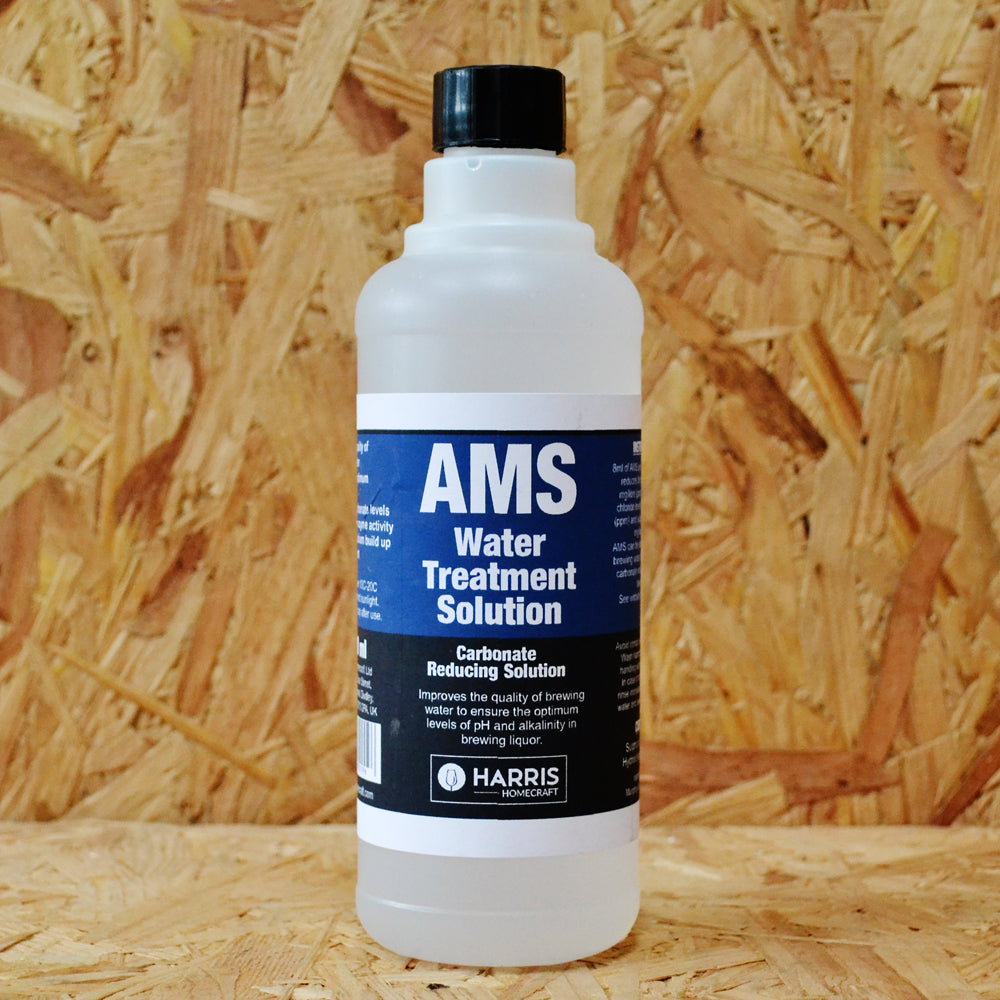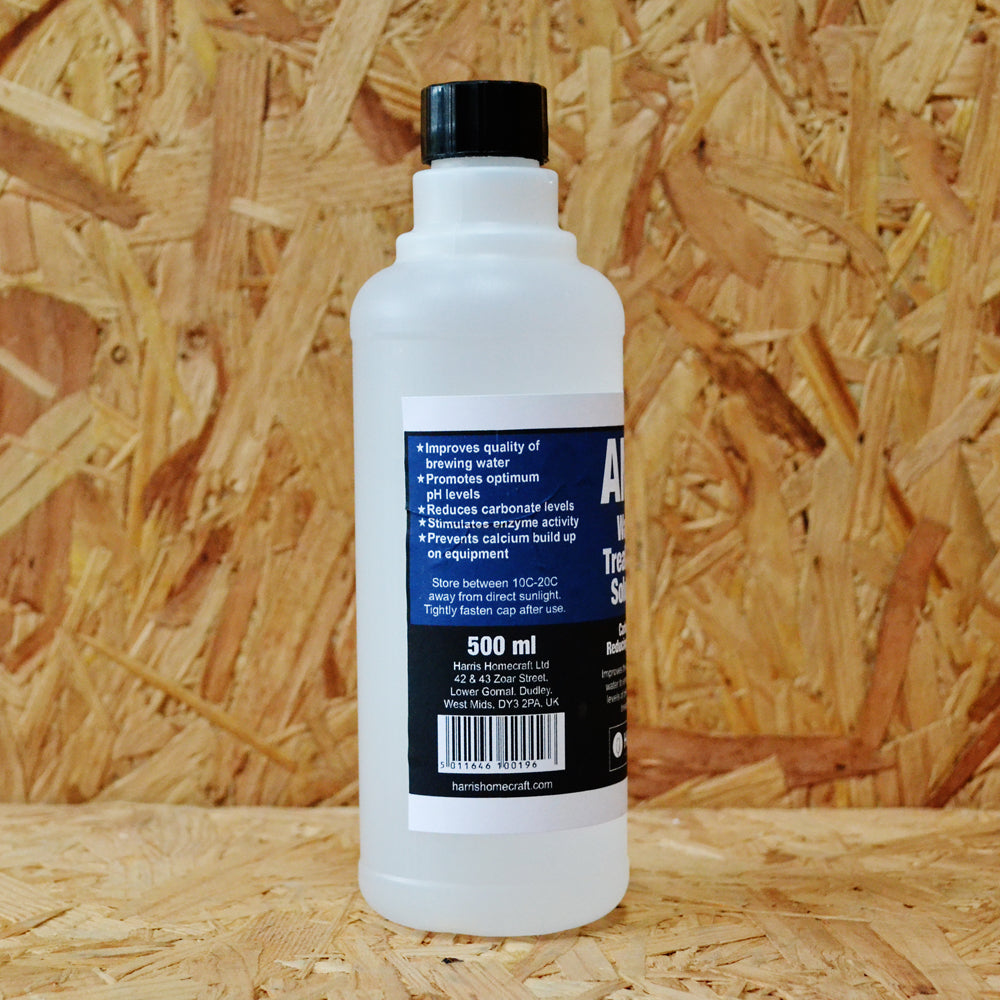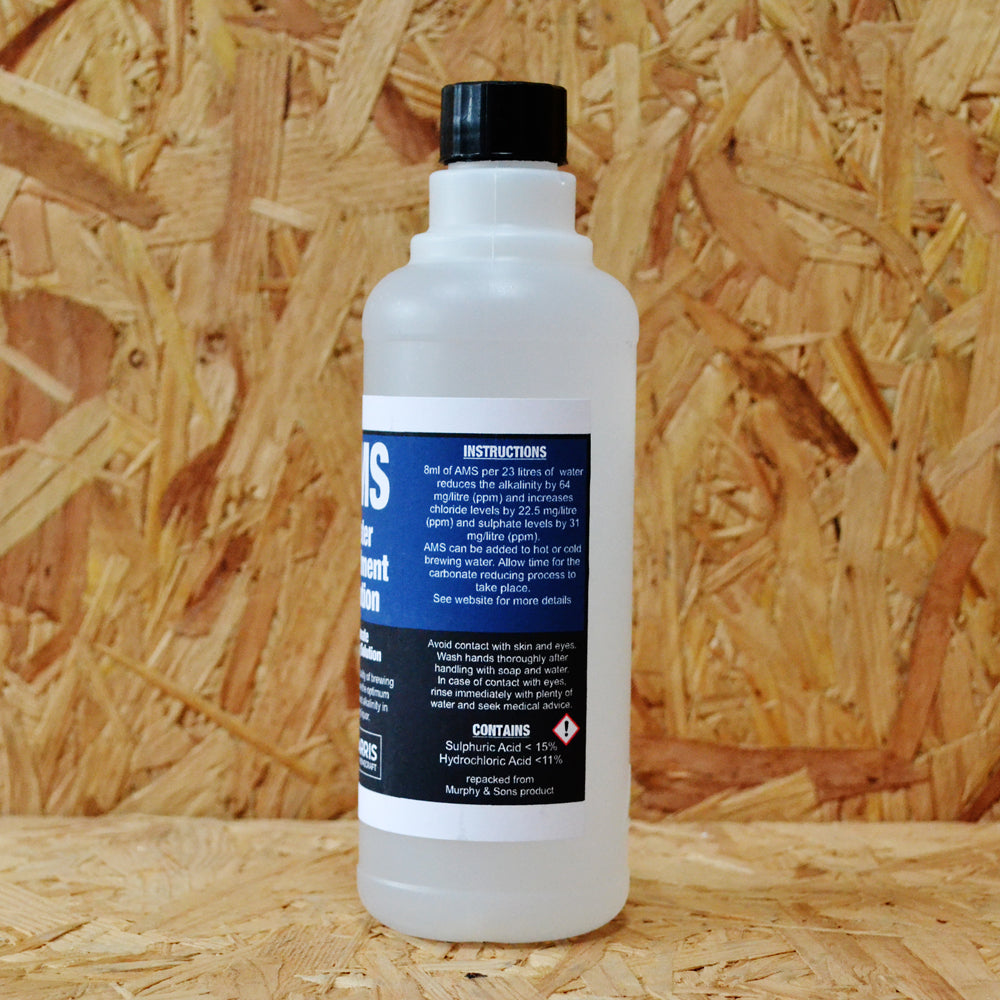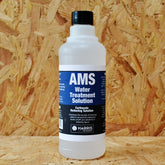


AMS Water (Liquor) Treatment For Brewing Beer - 500ml - Harris
Add this item to your cart and then use our handy Shipping Calculator on the basket page to calculate your delivery charge.
Delivery to UK addresses starts at just £1.50 and orders over £70 are eligible for free UK delivery*
AMS Water Treatment Solution is a formulated blend of ready for use food grade acids used to reduce alkalinity and to increase desirable ions in the beer brewing liquor.
Benefits
• Reduces the alkalinity levels of brewing liquor.
• Gives optimum pH levels throughout the whole brewing process.
• Stimulates maximum enzyme activity during mashing.
• Improves extract yield and fermentability.
• Improves wort run off, clarity and stability.
• Adds desirable chloride and sulphate ions in suitable proportions.
• Reduces extraction of undesirable compounds that can cause astringent off flavours.
• Does not sour the wort like some other acids.
The objective of liquor treatment is to convert your water supply into acceptable liquor. Treating your brewing liquor is vitally important. When applied correctly all the steps throughout the brewing process will be at the optimum pH, meaning you will get a good mash efficiency and a beer that will easily clear.
Alkalinity is mainly caused by calcium carbonate and bicarbonate. The alkalinity of your liquor plays a very important role in pH control. It causes high pH values throughout the brewing process. Hydrogen ions are removed from solution, thus wort pH remains high which can result in low extract yield; the presence of undesirable protein components; worts and beers more prone to infection; an increased extraction of silicates, polyphenols and tannins during sparge, which can result in harsh “after tastes” in the finished beer.
The pH of the liquor will have little effect on the pH of the wort and beer. Alkalinity and calcium are more important in pH control. Once you have established correct levels of these ions it is advisable to follow the guidelines of typical pH measurements in the brewing process shown below...
Raw Liquor pH 6.0-8.0
Treated Liquor pH 6.0-8.0
Mash pH 5.2-5.5
1st Runnings pH 4.8-5.2
Last Runnings pH 5.4-5.6
Wort in Copper pH 5.1-5.4
Wort after boil pH 4.9-5.3
Beer after fermentation pH 3.7-4.2
AMS Water Treatment can be added to either the cold or hot liquor tank and should be thoroughly mixed. Time should be allowed to release the carbon dioxide produced by the neutralisation of excess carbonate. Please take into account any residual treated liquor when topping up your tank as this will affect alkalinity levels. Addition of AMS to the cold liquor tank has the added benefit of preventing scale build up on the heating elements.
Addition rates for AMS are dependant on the levels of alkalinity and other important ions present in your untreated liquor. Raw liquor can have an alkalinity of up to 300 mg/litre.
Brewers need to reduce their alkalinity down to a range of 30–100 ppm (refer to table below) depending on which beer styles they wish to produce. In some cases raw liquor can already be in that range so no acid treatment is required.
Levels of the relevant ions present in your liquor can be obtained from your Local Water Authority. Please note, Local Authority reports can provide results that are not up to date and may affect your calculations for ideal dosage rates. It is advisable to check the analysis of your water at least once a year, or on a more regular basis if the supply changes.
Another method of working out your alkalinity on a more regular basis, is to purchase alkalinity testing kits.
Once you have obtained your analysis of your raw liquor you can then calculate your dosage rates by selecting which beer type you wish to brew and refer to table this will help you determine how many ions to add or reduce.
All water used for brewing should be checked for suitability for beer style according to the table below. This includes any water that is used from the liquor tank, sparge or breakdown liquor.
| Bitter | Strong Bitter | Lager (65°C) | Porter | Mild | Wheat | Stout | |
| Calcium | 180-220 | 200-220 | 120-140 | 130-160 | 120-140 | 180 | 120-140 |
| Alkalinity | 30-50 | 30-50 | 30-50 | 100 | 100 | 35 | 150 |
| Chloride | 150-300 | 200-300 | Low | 200-300 | 300 | 250 | 300 |
| Sulphate | 250-400 | 300-400 | Low | 200-300 | 150 | 220 | 100 |
35ml of AMS Water Treatment per 100 litres (1hl) (thats 8ml AMS per 23 litres) of water reduces the alkalinity by 64 mg/litre (ppm) and increases chloride levels by 22.5 mg/litre (ppm) and sulphate levels by 31 mg/litre (ppm).
Knowing this information you can calculate the amount of AMS needed to reduce your alkalinity to the ideal level. This also helps you to monitor how much sulphate and chloride you have added. This addition of chlorine and sulphate ions has to be considered when adding other salts to the grist.
WARNING: Corrosive! May cause burns if touches skin. Wash any splashes on skin immediately with cold running water. If contact with eyes, rinse under cold running water and seek medical advice. Do not ingest, drink or inhale. If ingested seek immediate medical help.
Wear protective clothing, gloves and eye protection when using.
Contains Sulphuric Acid <15%, Hydrochloric Acid <11%.
Repackaged from a Murphy & Sons Product. More information, Guidance, Technical Data Sheets and Safety Data Sheets can be obtained from Murthy and Sons website - www.murphyandson.co.uk/product/ams/

